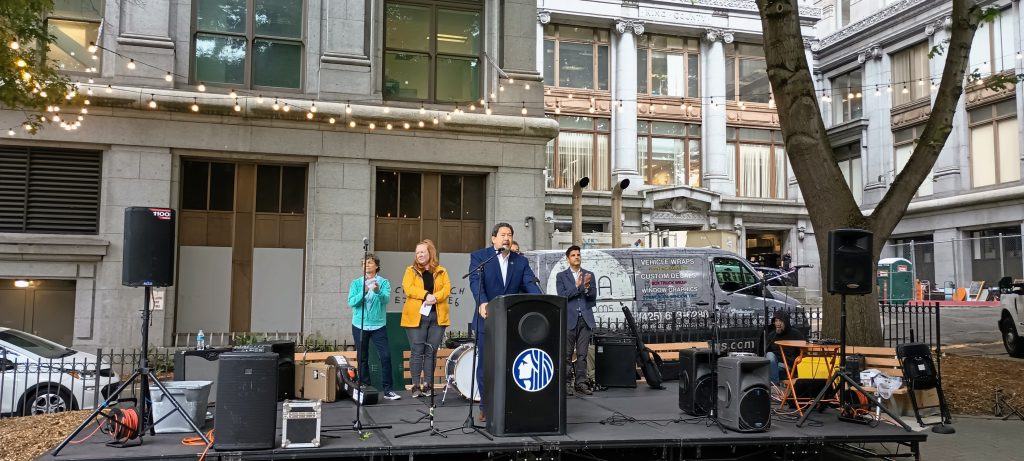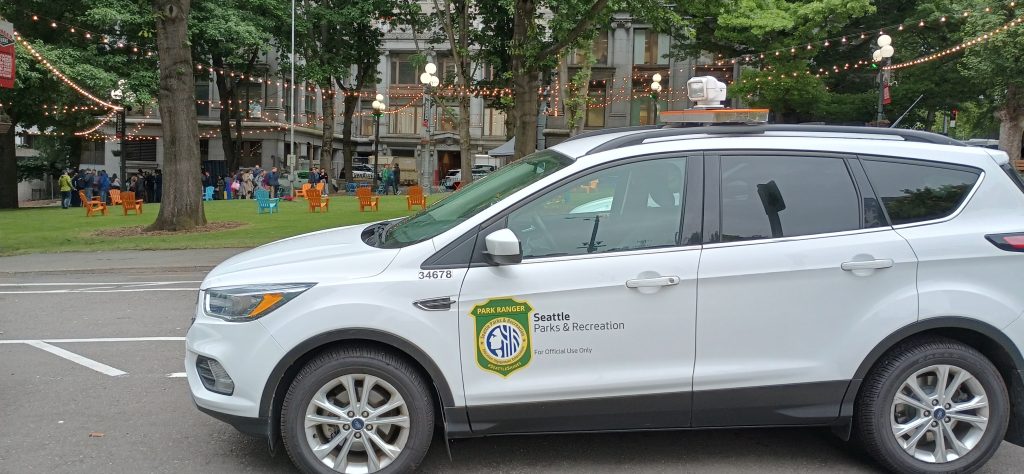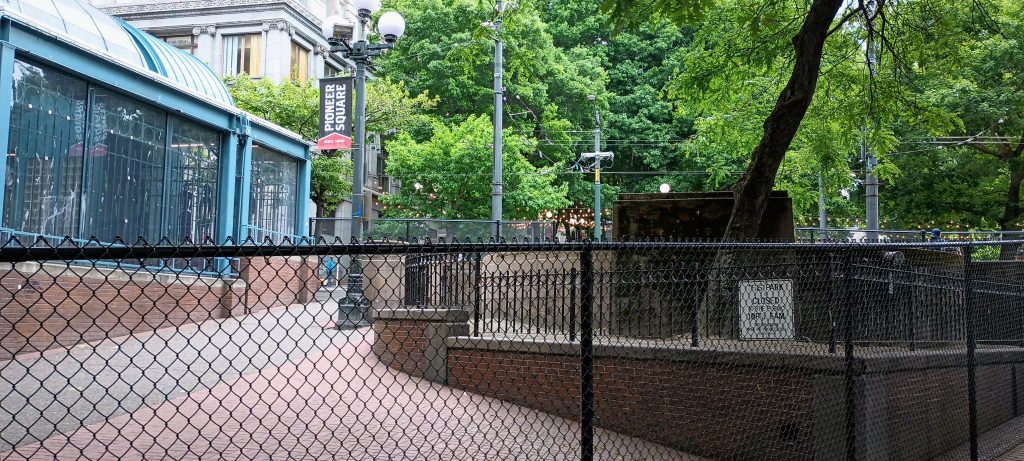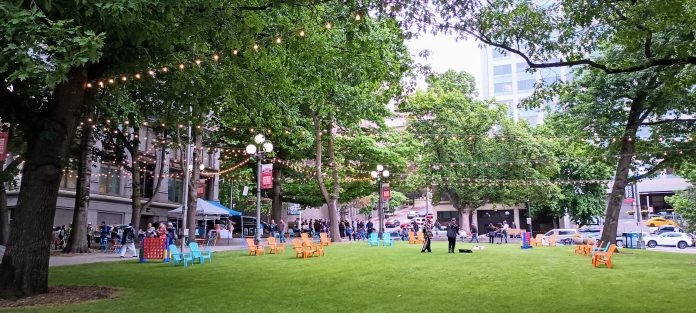Seattle officials welcomed residents and visitors back to City Hall Park in Pioneer Square Tuesday, nearly two years after the park closed indefinitely in August of 2021 due to a proliferation of homeless encampments. The grand reopening represents a high-profile milestone in Mayor Bruce Harrell’s quest to activate and revitalize downtown following the pandemic, and the ability to keep the park open and welcoming will be a significant self-imposed test of the Mayor’s ability to follow through on implementing elements of his widely touted “downtown activation plan.”
“This rejuvenation of City Hall Park filled with enhanced amenities and a robust activation plan is not just an investment in our city’s landscape, but an investment in you, our people,” Mayor Harrell said at the park’s grand reopening, surrounded by city officials. City employees had been encouraged to make the trip from their offices nearby at municipal buildings to pack the small wedge of land.
The City had used every tool in the toolbox to liven up the park on its first day, from food trucks parked along the Fourth Avenue sidewalk, an added restroom near Third Avenue, added seating and lawn games, and, most importantly, a ton of people eager to check out the refreshed park space, in the shadow of the King County Courthouse. The courthouse used to be jointly operated as Seattle City Hall — hence the park’s name, a few blocks away from the modern seat of city government.

“This opening today is a reflection of a start of the city coming back better and stronger,” Seattle Parks and Recreation Superintendent AP Diaz told the crowd of dignitaries. Diaz doubled down on the message of a “robust” activation strategy that will include having buskers and other events in the park throughout the summer, with the coming winter months likely proving a larger challenge for the city to weather.
The road to City Hall park’s reopening took some twists and turns. During the long closure, King County leaders proposed taking over the park, given its proximity to the county courthouse and administration building, in a land swap that would have included several small parcels elsewhere in the city that would have been turned over to Seattle. The County didn’t appear to trust Seattle to steward the public space toward an outcome that would work for their visions for a civic campus, though exactly what the County intended to do to the park, apart from possibly keep it closed indefinitely, was never clear.

Ultimately, though the land swap was approved by the County Council, it met its demise when there appeared to be little appetite at the Seattle Council to go along with the County’s plan. A 2022 agreement between Mayor Harrell and County Executive Dow Constantine included a proposal by Harrell to invest nearly $3 million this year to open the park and keep it activated.
“Making this long-neglected space a safe and enjoyable park for thousands of King County staff, jurors, customers, visitors and residents will help restore and revitalize downtown Seattle,” Constantine said at the time. “King County appreciates Mayor Harrell’s proposal to create a safe and welcoming front yard for our historic courthouse.”
Seattle Parks appears to be depending on the Park Ranger program, currently in the process of being expanded to a team of 28 people, to respond to issues that may arise in City Hall Park and other downtown public spaces. Empowered to issue civil violations of the parks code, unarmed Parks Rangers have been limited to downtown parks only for a decade-and-a-half since a labor dispute with the Seattle Police Officers’ guild. Parks is also counting on its Park Ambassadors, staff that function like concierges and which could help many parks follow the model established by the Downtown Seattle Association’s staffed activation of other parks downtown like Westlake and Occidental.

Across the street from City Hall Park, the City has nearly completed putting a fence around the Prefontaine Fountain immediately adjacent to Pioneer Square light rail station. For decades, the fountain has been a gathering spot for people who access nearby human services in the neighborhood, and it looks like the City is heading toward following the City Hall Park model for this smaller public space: close it indefinitely in the hopes that the poor people who formerly used the space will disburse. But like with City Hall Park, a closed park isn’t shelter or services.

For the Harrell administration, reopening a downtown park that the previous administration arbitrarily closed provides a relatively straightforward win. Even more than keeping it open, the challenging part comes in the form of implementing the broader downtown activation plan that reorients the struggling areas of downtown, like the area around King County’s civic campus, into a place where people — including well-heeled office workers — want to spend time seven days a week, 12 months per year.
Ryan Packer has been writing for The Urbanist since 2015, and currently reports full-time as Contributing Editor. Their beats are transportation, land use, public space, traffic safety, and obscure community meetings. Packer has also reported for other regional outlets including BikePortland, Seattle Met, and PubliCola. They live in the Capitol Hill neighborhood of Seattle.


